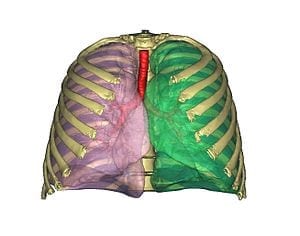If Immigration Law Doesn’t Get In The Way
Six years ago, we wrote about Andy Kessler’s fascinating book, The End of Medicine, which got me to totally rethink how nearly every society approaches healthcare today. Even though the book is years old, I recommend it frequently. The key issue is that we still tend to treat healthcare as something driven by two key industries: pharmaceuticals and insurance. However, the book is based around the idea that, in pretty much every other industry, technology tends to (1) get better and (2) get cheaper. But that doesn’t happen much with healthcare — and that’s because it’s all about insurance and drugs. That means it’s really about treating the symptoms, rather than actually trying to prevent problems.
One story in the book that has stuck with me is the description of a possible home-based heart scanner. The argument was that we really aren’t that far off from being able to wake up in the morning, walk into the bathroom and scan your body, such that your computer (or phone?) would immediately pop up a 3D scan of key internal organs, such as your heart, allowing you to see if everything’s okay. No waiting for chest pains before you get your heart checked out. Why not check out your heart every single day, and have the 3D model immediately available?
We’re not quite there yet, but a few months ago, I was introduced to Dr. Fabien Beckers and his co-founders of the fascinating startup Morpheus Medical — and when he described the product they were working on, which some have called “a Google Earth for cardiologists”, I immediately recalled that product from Kessler’s predictions. Morpheus is building an amazing product, where a simple heart scan creates a 3D model of the heart non-invasively and shows flows and pressure. Morpheus doesn’t go quite as far as the example in Kessler’s book yet, but this is a serious team and the existing product looks amazing. You can read a bit more about the offering here. Among the key features is the fact that they can just use data from a quick MRI to build this 3D model and show all sorts of useful data to doctors at a fraction the cost of what’s out there today. A product that is cheaper, faster, better and can help keep people healthy? It seems amazing.
The team leading the company really is a bunch of all-stars. Dr. Beckers has run a series of companies, often driven by the ability to use technology to advance social good. For example, before Morpheus, he built and ran a company called Kameleon Technologies — which was initially built off the idea of helping design a better guidance system for the blind. That technology then expanded to be useful in the consumer space, using the same concept to create interactive billboards for advertising purposes, called Mobizone. And, oh yeah, he has a PhD in quantum mechanics from Cambridge University — hence the “Dr.” title. The rest of the team is equally talented. The origin of the company came from a meeting between Dr. Beckers and John Axerio-Cilies, who was working on a PhD in fluid dynamics at Stanford. Add to that Albert Hsiao who has a PhD in bioengineering, and Shreyas Vasanawala, an associate professor at Stanford whose own works is focused on pediatric MRIs, and it’s a monster team of innovators building an offering that I hope drives the healthcare revolution in the direction that Kessler described in his book.
It will not surprise some that the biggest roadblocks the company may face are regulatory, rather than technological. But the amazing thing is that the biggest one may be immigration regulations.
via TechDirt – Mike Masnick
The Latest Streaming News: Real Medical Tech Breakthrough updated minute-by-minute
Bookmark this page and come back often
Latest NEWS
Latest VIDEO








